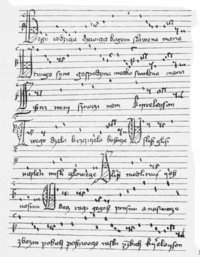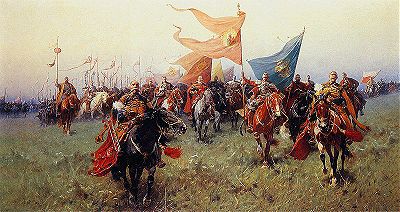
Bogurodzica
Encyclopedia

Poland
Poland , officially the Republic of Poland , is a country in Central Europe bordered by Germany to the west; the Czech Republic and Slovakia to the south; Ukraine, Belarus and Lithuania to the east; and the Baltic Sea and Kaliningrad Oblast, a Russian exclave, to the north...
religious hymn. It was composed somewhere between the 10th and 13th centuries. The origin of the song is not clear.
Polish knights sang it as an anthem before the Battle of Grunwald
Battle of Grunwald
The Battle of Grunwald or 1st Battle of Tannenberg was fought on 15 July 1410, during the Polish–Lithuanian–Teutonic War. The alliance of the Kingdom of Poland and the Grand Duchy of Lithuania, led respectively by King Jogaila and Grand Duke Vytautas , decisively defeated the Teutonic Knights, led...
and during the battle with the Turkish
Turkey
Turkey , known officially as the Republic of Turkey , is a Eurasian country located in Western Asia and in East Thrace in Southeastern Europe...
army at Varna
Battle of Varna
The Battle of Varna took place on November 10, 1444 near Varna in eastern Bulgaria. In this battle the Ottoman Empire under Sultan Murad II defeated the Polish and Hungarian armies under Władysław III of Poland and János Hunyadi...
in 1444. Bogurodzica also accompanied the coronation ceremonies of the first Jagiellonian kings.
History

- the Kcynia record including two initial stanzas together with musical notation;
- the KrakówKrakówKraków also Krakow, or Cracow , is the second largest and one of the oldest cities in Poland. Situated on the Vistula River in the Lesser Poland region, the city dates back to the 7th century. Kraków has traditionally been one of the leading centres of Polish academic, cultural, and artistic life...
record covering thirteen stanzas without notes.
Other records date back to the second half of the fifteenth century, the turn of the fifteenth and sixteenth centuries and to the beginning of the 16th century. In 1509 the song was printed in Kraków in Jan Łaski's Statut.
The origin of the song is not clear (the thesis about the authorship of St Adalbert has been rejected). It used to be related either to Latin liturgy, the tradition of church hymns, Greek or Old Church Slavonic influences, Western or Eastern culture. The two initial stanzas were created first - probably in the middle or at the end of the thirteenth century, or possibly at the very beginning of the fourteenth century.
Bogurodzica is a prayer hymn whose first stanza contains an invocation to Christ through the intercession of Mary. It begins with an apostrophe to her - to the Mother of Christ, the Virgin, praised by God, the chosen one. After the apostrophe, there is an appeal to Mary to win favour for people from her Son.
The second stanza begins with a direct addresses to Christ (called God's Son) - with an invocation to John the Baptist who can support human imploring. The prayer closing this stanza contains a request that Christ give people a blissful stay on earth and, after death, everlasting existence in heaven. The subsequent stanzas develop various motifs: Easter, the Passion, a litany - with invocations to the saints.
Bogurodzica was initially connected with the mass and procession but already in the fifteenth century it became a knight's battle hymn. Thanks to Jan Długosz (historian, author of Annales seu Cronicae incliti Regni Poloniae) we know that it was sung at Grunwald in 1410 as well as before other battles in subsequent years. It also accompanied the coronation ceremonies of Władysław Warneńczyk. That is why Długosz called Bogurodzica "carmen patrium" (the hymn of the motherland). In the next centuries the hymn lost its significance. It regained its position of "carmen patrium" in the nineteenth century and has held it to the present day.
Lyrics
Bogurodzica dziewica, Bogiem sławiena Maryja,U twego syna Gospodzina Matko zwolena, Maryja!
Zyszczy nam, spuści nam.
Kyrie elison!
Twego dziela Krzciciela, bożycze,
Usłysz głosy, napełń myśli człowiecze.
Słysz modlitwę, jąż nosimy,
A dać raczy, jegoż prosimy:
A na świecie zbożny pobyt,
Po żywocie rajski przebyt.
Kyrie elison!
English
Virgin, Mother of God, God-famed Mary!
Ask Thy Son, our Lord, God-named Mary,
To have mercy upon us and hand it over to us!
Kyrie eleison!
Son of God, for Thy Baptist's sake,
Hear the voices, fulfill the pleas we make!
Listen to the prayer we say,
For what we ask, give us today:
Life on earth free of vice;
After life: paradise!
Kyrie eleison!
Quotations in modern music
Andrzej PanufnikAndrzej Panufnik
Sir Andrzej Panufnik was a Polish composer, pianist, conductor and pedagogue. He became established as one of the leading Polish composers, and as a conductor he was instrumental in the re-establishment of the Warsaw Philharmonic orchestra after World War II...
- Sinfonia sacra (1963)
Wojciech Kilar
Wojciech Kilar
Wojciech Kilar ; b. 17 July 1932 in Lwów, Poland) is a Polish classical and film music composer.-Biography:Wojciech Kilar is one of Poland’s esteemed composers. Born in 1932 in Lwów . His father was a gynecologist and his mother was a theater actress...
- Bogurodzica for choir and orchestra (1975)
Krzysztof Meyer
Krzysztof Meyer
Krzysztof Meyer is a Polish composer, pianist and music scholar.-Biography:Meyer was born in Cracow. As a boy he played piano and organ. He began his composition study early – in 1954, with Stanisław Wiechowicz...
- Symfony No. 6 "Polish" (1982)


